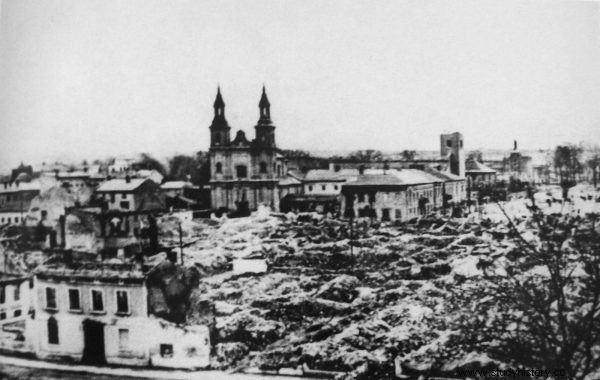The first German bombs fell on Wieluń at 4:40. It only took a few hours for the border town to turn into a pile of rubble. The Germans carried out the attack despite the fact that the city was an undefended target and that there were no significant military targets in it.
Friday, September 1, 1939 was a market day in Wieluń. Many local peasants came to the town in the early morning to trade with their agricultural produce. When the first planes appeared and the sirens wailed, it did not cause any particular panic. Residents and visitors were convinced that they were watching only the previously announced test anti-aircraft alarm.
City turned to ruins
The first German bombs fell at 4.40. They were aimed at the All Saints Hospital:a one-story, brick 19th-century building designed by the outstanding Polish architect Henryk Marconi. The facility was completely destroyed. 32 people died in its ruins. The hospital was bombed despite the large red cross signs painted on its roof.
By 2 p.m., as a result of repeated air raids, Wieluń turned into a smoking site. About 75% of the city's buildings were demolished. Many historic buildings were left in ruins and valuable sacred buildings were destroyed. About 1,200 people died.
Helpless target
The German Blitzkrieg in Poland began with the criminal bombing of this defenseless city. When the Luftwaffe dive bombers attacked Wieluń, a town with 15,000 inhabitants right on the German border, there were practically no significant military targets in the city. What, then, was the raid decision?

As a result of the hours of bombardment of Wieluń, 75% of the buildings were destroyed and about 1,200 people died.
According to many opinions, the object of the attack was selected deliberately by the commander of the divers, General Wolfram von Richthofen, who wanted to test in practice the destructive capabilities of the then latest Junkers Ju-87B bomber. He was, by the way, the same man who had ordered the razing of Spanish Guernica two years earlier.
The command of the German air force cynically violated the provisions of the Hague Convention prohibiting the taking of hostilities against non-defended civilian objects.
Criminal Pride Offended
Perhaps it was also about the offended ambition of the German general. Just two weeks before the attack on Poland, Richthofen's dive bombers turned out disastrously. It was then that, at the Neuhammer (now Świętoszów) training ground, 13 out of 14 Junkers hit the ground while bombing a mock target. It was a considerable embarrassment for the commander, especially since the incident took place in the presence of high-ranking Luftwaffe officials.

The truth about the horror of the German occupation in the book by Dariusz Kaliński entitled "Balance of harms" .
So did the disgusting crimes against Poles happen only to show that German airmen can do their best in combat? Or rather - that they can murder unprotected victims and destroy civilian facilities, in violation of international law and the elementary rules of war?
It looks. And it was only the first in a series of Nazi crimes still unsettled today. You can read about this and the next ones in my new book: "Balance of harm. What the German occupation of Poland really looked like. ”
